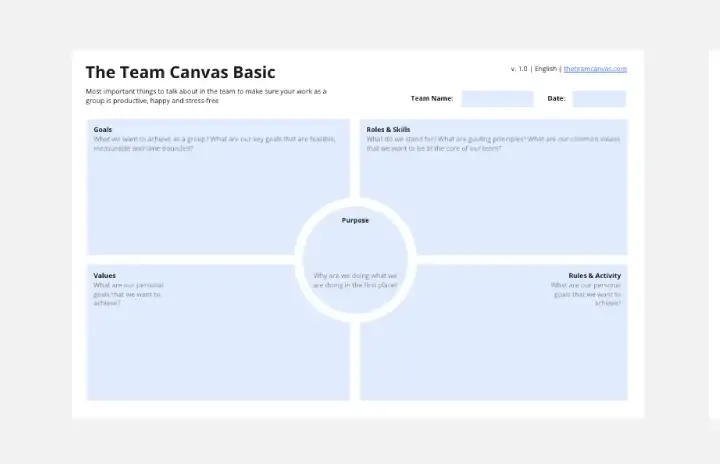The Team Canvas (Basic)
The Team Canvas Basic is a short 30 to 45 minute version of the Team Canvas framework that is suitable for starting new teams, aligning on common vision and basic agreements. It is pretty fast and works best on short projects, or when a new member joins the team.
When to use The Team Canvas
Based on our experience with startups and creative groups, it is made to smoothly start collective projects, let people learn about each other and accumulate enough momentum to get going.Team Canvas Basic works best at the following touch points:
creating a team;
kicking off a project;
welcoming new team member (e.g. freelancer joining the team);
basic team alignment meeting.
How does The Team Canvas work?
You’ll be guided through 5 key concepts:
Purpose: What is the team's purpose: the Why behind your goals? 5 mins
Goals: What are the goals for the whole team, as well as for each team member? 5 mins
Values: What are the core values that you share as a team? 5 mins
Roles & Skills: What are the roles and corresponding skills that each member brings to the table? 5 mins
Rules & Activities: What are the ground rules that you want to agree on? How are you going to communicate? How would you make your decisions? How are you going to plan, execute and evaluate them? 5 mins
This template was created by Alex Ivanov.
Get started with this template right now.
The Hot Air Balloon Retrospective
The Hot Air Balloon is a simple activity for helping the team identify things that makes them move faster, and things that slow them down.
Midnight Sailboat Retrospective
Works best for:
Retrospectives, Meetings, Agile Methodology
The Midnight Sailboat Retrospective template offers a metaphorical journey through past experiences and future aspirations, likening the retrospective process to a midnight sailboat voyage. It provides elements for reflecting on challenges faced, lessons learned, and goals for the future. This template enables teams to navigate uncertainties, chart a course for success, and foster a culture of resilience. By promoting reflection and metaphorical thinking, the Midnight Sailboat Retrospective empowers teams to overcome obstacles, embrace change, and sail towards their goals effectively.
Agile Retrospective
Works best for:
Retrosprective, Agile Methodology, Meetings
The Agile Retrospective template offers a dynamic and adaptive framework for teams practicing agile methodologies. It provides elements for reflecting on sprint performance, identifying bottlenecks, and planning improvements. This template enables teams to adapt and refine their processes continuously, fostering a culture of learning and innovation. By promoting agility and adaptability, the Agile Retrospective empowers teams to optimize their workflows, drive continuous improvement, and deliver value to their stakeholders effectively.
Team´s High Performance Tree
Works best for:
Agile, Meetings, Workshops
The Team's High Performance Tree is a visual representation of the factors influencing team performance. It provides a structured framework for identifying strengths, weaknesses, and areas for improvement. By visualizing factors such as communication, collaboration, and leadership, this template enables teams to assess their performance and develop strategies for enhancement, empowering them to achieve peak performance and deliver exceptional results.
Cost-Benefit Analysis Template
Works best for:
Leadership, Decision Making, Strategic Planning
With so many day-to-day decisions to make—and each one feeling high-stakes—it’s easy for all the choices to weigh a business or organization down. You need a systematic way to analyze the risks and rewards. A cost benefit analysis gives you the clarity you need to make smart decisions. This template will let you conduct a CBA to help your team assess the pros and cons of new projects or business proposals—and ultimately help your company preserve your precious time, money, and social capital.
Kanban Framework Template
Works best for:
Kanban Boards, Agile Methodology, Agile Workflows
Optimized processes, improved flow, and increased value for your customers — that’s what the Kanban method can help you achieve. Based on a set of lean principles and practices (and created in the 1950s by a Toyota Automotive employee), Kanban helps your team reduce waste, address numerous other issues, and collaborate on fixing them together. You can use our simple Kanban template to both closely monitor the progress of all work and to display work to yourself and cross-functional partners, so that the behind-the-scenes nature of software is revealed.
